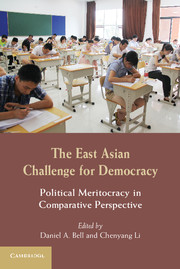Book contents
- Frontmatter
- Dedication
- Contents
- Contributing Authors
- Acknowledgments
- Introduction
- Section I The Theory of Political Meritocracy
- Section II The History of Political Meritocracy
- 6 Between Merit and Pedigree
- 7 A Society in Motion
- 8 Meritocratic Democracy
- Section III Realizing Political Meritocracy Today
- Index
- References
8 - Meritocratic Democracy
Learning from the American Constitution
Published online by Cambridge University Press: 05 June 2014
- Frontmatter
- Dedication
- Contents
- Contributing Authors
- Acknowledgments
- Introduction
- Section I The Theory of Political Meritocracy
- Section II The History of Political Meritocracy
- 6 Between Merit and Pedigree
- 7 A Society in Motion
- 8 Meritocratic Democracy
- Section III Realizing Political Meritocracy Today
- Index
- References
Summary
The aim of this chapter is to discuss the enduring relevance of the American founding debates to today's controversies concerning the possibility of reconciling democracy and meritocracy. America's founders were keenly aware of the problem of securing competent rule in a republic (or what we would call a constitutional democracy based on political representation), and they proposed imaginative ways of addressing it. Although I think the project of democracy in the modern world was greatly advanced by the debates surrounding the U.S. Constitution and the subsequent development of America's constitutional institutions, I do not argue that these provide a blueprint for other nations: national circumstances differ widely, and constitution makers now have far more experience to draw on than was available in 1787. I want here to emphasize one salient point for today's debates: the founders were fundamentally correct in judging that popular self-government permits and can benefit from considerable delegation of power to officeholders insulated from direct electoral accountability to the people. So long as unelected officials are held accountable in other ways – for example, by being required to give reasons in public for their decisions – they may help us combine the virtues of democratic and meritocratic rule. Indeed, so pervasive in modern constitutional systems are mechanisms designed to elicit competent government – via representation, delegation, insulation from direct accountability, and requirements of public reason-giving – that it makes no sense to regard democracy and meritocracy as necessarily opposed.
- Type
- Chapter
- Information
- The East Asian Challenge for DemocracyPolitical Meritocracy in Comparative Perspective, pp. 232 - 256Publisher: Cambridge University PressPrint publication year: 2013
References
- 7
- Cited by



